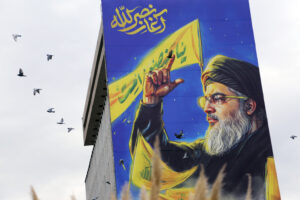Nigeria’s displacement camps overwhelmed amid closures
Maiduguri, Nigeria (AFP):
Camps for people fleeing conflict in northeast Nigeria have become overwhelmed after the authorities closed a dozen of the sites over the past year to try to prompt families to return home.
For Aisha Usman, who is among those displaced by violence, the situation has made it harder and harder to feed her large family.
For eight years, Usman, her husband and their nine children have lived in the informal camp of El-Miskin, home to around 7,200 displaced people, in the Borno State capital of Maiduguri.
“They put us all in one place. We’re sitting under trees doing nothing. It’s like we’re in jail,” she said.
Yet for Usman, there is no question of returning to Gradai, her village located 200 kilometres (120 miles) away.
In 2014, Boko Haram attacked the family’s house and killed her neighbours before her eyes. One of her children was kidnapped and never returned.
“I’m afraid they’ll come back and kill us if I go back home,” she said of the group.
“There is hunger there. They are still in the bush… our lives would still in be danger.”
Nowhere to go
A bloody conflict in northeastern Nigeria has been raging for 14 years between the army and rebel groups, including Boko Haram.
More than 40,000 people have been killed and two million more displaced, creating one of the gravest humanitarian crises of the 21st century.
More than 100,000 people in recent years took refuge in Maiduguri, which is protected by security trenches and guarded by the army.
Most of them resided in official camps run by government authorities, who began closing them a year ago, claiming to have secured the countryside.
The move is part of a wider bid by the leaders of Borno State to close all camps by 2026 with an aim to end dependence on humanitarian aid and encourage displaced people to return to their fields.
But the result is that informal camps like El-Miskin are now overflowing and conditions are deteriorating.
Usman said she had been forced to beg and send her children to sell water to passers-by to pay for food as aid is scarce.
Others driven from the closed sites have spilled out to the remaining official camps further afield, according to the United Nations, like in the city of Bama, 70 kms southeast.
Bama has been swamped by the arrivals, some newly fleeing from the countryside where insurrections are ongoing. Its official camp for displaced people, called GSSS, was built for 25,000 people but now hosts 100,000.
Many venture outside Bama every day and cross the security trenches to collect wood or scrap metal to resell for cash.
“Food insecurity in Bama is severe… and has worsened since the closing of the camps in Maiduguri, with lack of land for farming due to insecurity,” said Ibrahim Mohamed Kari, a doctor in a centre for malnourished children.
Around 4.4 million people face food insecurity in northeast Nigeria, the UN says.
‘Dormant conflict’
Authorities insist that no-one is being forced to return home, however, a small financial aid payment is offered to those who go back.
To reassure the population, recently re-elected Governor Babagana Zulum is promoting a return to calm in the region.
President Bola Ahmed Tinubu has also said solving Nigeria’s complex insecurity is one of his main priorities.
But NGOs operating in the region are sceptical.
“How are we sure where they are taking them (is) safe for them to return?” asked Genesis Abamini, an official for a camp in Damboa, where nearly 30,000 displaced people are crowded.
“If the areas where they are coming from were safe, they wouldn’t mind to (go) back and continue their farming, which is their means of livelihood.”
Attacks have slowed from several years ago, but militants remain active.
The so-called Islamic State in West Africa Province (ISWAP) has become dominant in the region since the death of Boko Haram leader Abubakar Shekau in 2021.
In mid-June, 11 farmers were killed in a village about 15 kms from Maiduguri, on the highway to the town of Damboa.
“The road between Maiduguri and Damboa is very dangerous because there can be many ambushes,” said Brigadier General Omopariola, which hinders the arrival of humanitarian aid.
IS-affiliated militants are dug-in on the edge of the nearby Sambisa Forest.
For the brigadier, “the conflict is not over, it is dormant”.









